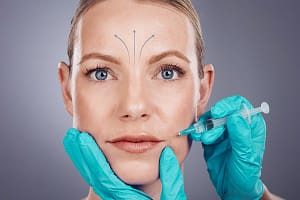When it comes to guidelines for using testosterone for cancer patients, there are no set rules for when to prescribe treatment.
Hormone replacement and cancer treatment have a rocky history. Some studies caution against using testosterone in cases of active cancer. Other research shows the positive benefits of testosterone replacement therapy.
For example, the use of testosterone therapy for prostate cancer patients was widely avoided for many years. Then, researchers realized that prostate cancer risk increased at the same time that testosterone levels decreased. Numerous studies backed up this theory, and now many doctors recommend the use of testosterone for men with prostate cancer.
It is up to each person to speak with their doctors to determine their best course of action. The internet also makes it easy to engage in personal research that may yield a better form of treatment. Our doctors here at National HRT also provide information to help our clients make the best possible decisions for their care.
What impact does testosterone have for prostate cancer?
For years, doctors warned men not to seek testosterone therapy for Low T due to the increased risk of prostate cancer. At the American Urological Association Annual Meeting on May 2015, the tide began to turn. Doctors reported that testosterone might help protect against prostate cancer rather than causing it. Of course, this would make sense since prostate cancer incidence increases as testosterone levels decline.
The use of testosterone replacement for prostate cancer patients is still controversial as some doctors hold onto old theories. Several recent studies have shown that TRT does not increase the progression of prostate cancer. Research presented also shows that men treated with radical prostatectomy receiving testosterone did not experience an increase in prostate cancer recurrence.
Another study shows positive results of using high-dose testosterone therapy to treat advanced prostate cancer.
For men who experience a reduced quality of life following cancer treatment, and as a result of Low T, these findings provide good news. Being able to use safe and effective testosterone for cancer patients following treatment can restore the quality of life.
How do doctors use testosterone to treat breast cancer?
High levels of estrogen may contribute to increasing the risk of breast cancer. Treatment with testosterone and an estrogen blocker (aromatase inhibitor) is an excellent option for menopausal women with an increased breast cancer risk.
What about the use of testosterone for breast cancer patients?
Testosterone therapy may be used in the following situations:
- Premenopausal women who have undergone oophorectomy and have hormone-responsive tumors
- Women 1 to 5 years postmenopausal with advancing inoperable metastatic breast cancer
The use of testosterone for cancer patients is determined by the treating oncologist based on each woman’s needs.
Testosterone therapy provides many benefits to women during menopause. Studies have even shown that testosterone replacement may lower the risk of breast cancer.
Many hormone doctors do not recommend the use of testosterone pellets in females, as used in the study. A better choice of treatment for women today is testosterone cream compounded to the prescribed dosing requirements.
Can you use testosterone after cancer treatment?
Perhaps one of the most important factors is the safety of testosterone for cancer patients once in remission. We find that many times, cancer occurs in later years of life after hormone levels begin to decline. This is especially true for women in menopause who experience breast cancer, as well as males with prostate cancer.
Aside from the normal decline in testosterone levels, cancer treatment often further lowers hormone production. Being able to receive testosterone replacement provides many benefits, including:
- Helping balance hormone levels
- Increasing energy
- Aiding in weight loss
- Improving muscle mass
- Strengthening the bones
- Regrowing hair
- Reducing feelings of depression
- Stimulating sex drive
- Supporting deeper sleep
- Enhancing mood and quality of life
Once cleared by an oncologist to begin testosterone therapy, individuals can receive doctor-supervised TRT from our hormone specialists.






Leave a Comment